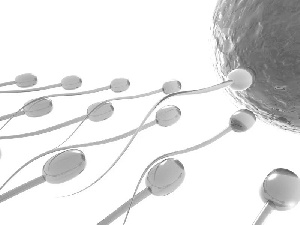FRIDAY, May 16, 2014 -- Men rendered infertile due to defects in their semen and sperm are more likely to die early than men with normal semen, new research suggests.
Over a period of about eight years, men with two or more abnormalities in their semen had a risk of death that was more than double that of men with healthy semen, researchers reported in the May 16 online issue of Human Reproduction.
Knowing this, doctors who treat men for infertility should advise them to adopt healthy habits that might boost their survival, said lead author Dr. Michael Eisenberg, assistant professor of urology and Stanford University School of Medicine's director of male reproductive medicine and surgery.
"There may be a window of opportunity here. When they see their doctor they could do some other things that might benefit them," Eisenberg said. "I see this as an opportunity to pay more attention to your health and be more proactive."
For the study, Eisenberg and his colleagues reviewed the medical records of about 12,000 men aged 20 to 50 who had visited either the Stanford University School of Medicine or the Baylor College of Medicine in Houston to be evaluated for possible infertility.
At both clinics, doctors had recorded information on patients' semen quality, such as total semen volume, sperm counts, sperm movement and shape. The researchers compared patient data with death records to track the men's death rates, while taking into account for underlying health issues that could compromise semen quality.
While no single semen abnormality in itself predicted early death, men with two or more such abnormalities had 2.3 times the risk of death during the study period than those with no semen abnormalities. The greater the number of abnormalities, the higher the risk of death, the study found.
Low semen volume, sperm concentration, sperm activity, total sperm count and the total count of active sperm specifically were associated with a higher risk. Abnormally shaped sperm did not appear to be linked to increased risk of death during the study follow-up.
"This striking increased death rate in men with abnormal semen parameters highlights the urgency and need to investigate the causes of male infertility and not to just proceed with assisted reproductive technologies," said Dr. Natan Bar-Chama, director of male reproductive medicine and surgery at the Icahn School of Medicine at Mount Sinai in New York City.
Bar-Chama, who was not involved with the study, added that "it is equally important to identify potential modifiable causes of male infertility that could be acted upon and subsequently decrease this increased mortality rate."
It's important to keep in mind that this study wasn't designed to prove that semen abnormalities lead to a higher rate of death, only to show there is an association between these factors.
However, the researchers have a number of theories as to why poor semen quality might be linked to premature death risk, Eisenberg said.
For example, reproduction is an essential human activity, with 10 percent to 15 percent of the male genome dedicated to propagation. "It's very easy to figure if you can't make sperm, there are probably other things your body can't do well," he said.
Sperm defects also could be caused by low levels of testosterone, an important male hormone that has been linked to longevity, Eisenberg noted.
And, Eisenberg added, social factors associated with fertility should not be ruled out. "If you look at studies, men who have children enjoy extended life and lower mortality," he said.
Women who are infertile likely face a similarly increased risk of death, he suggested, although this study only evaluated men.
"My belief is that infertility provides a window into a man's later health, and I think it would apply to both sexes," Eisenberg said. "We can expect to see the same effects in women as well."
Health News of Friday, 16 May 2014
Source: HealthDay News













